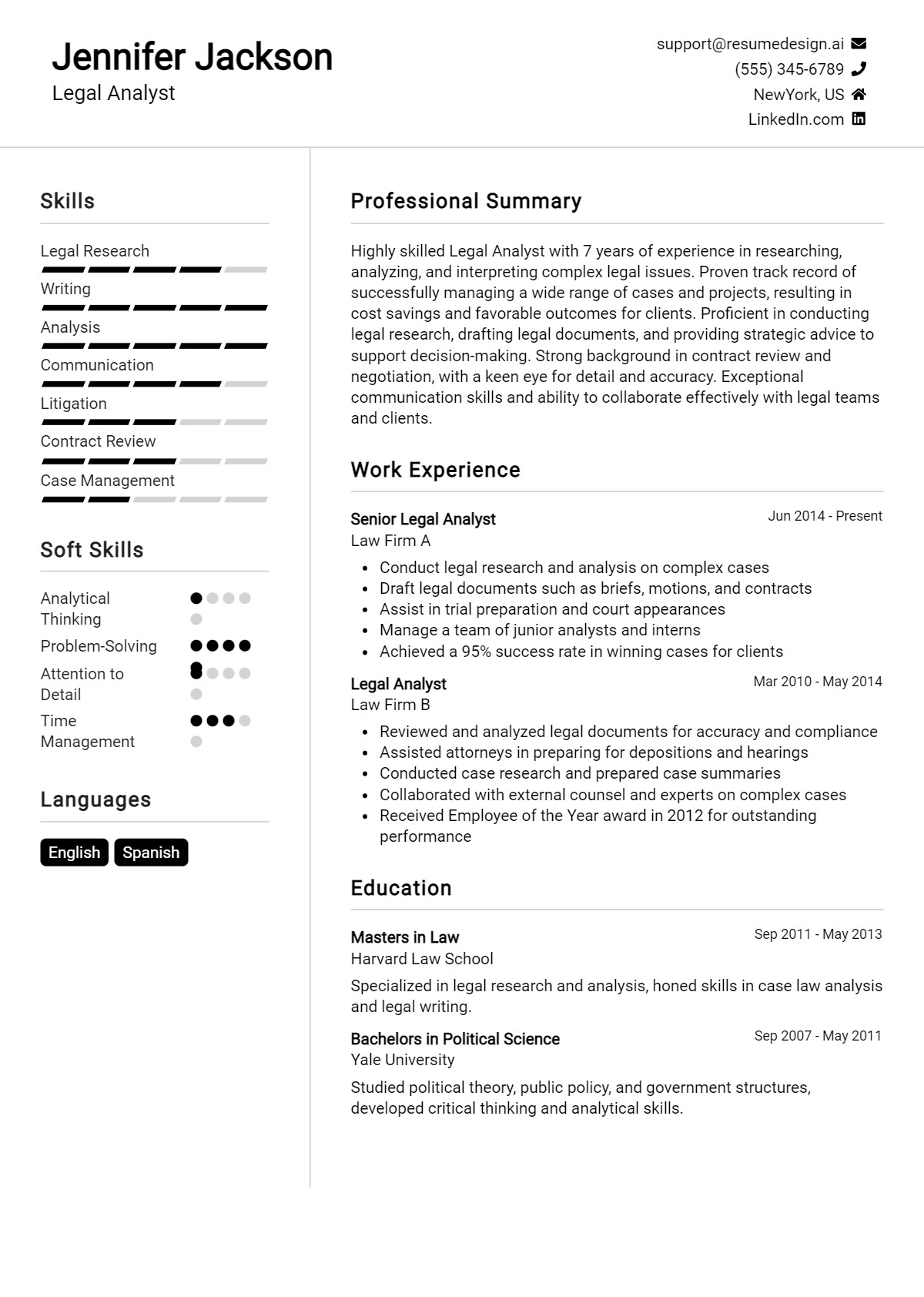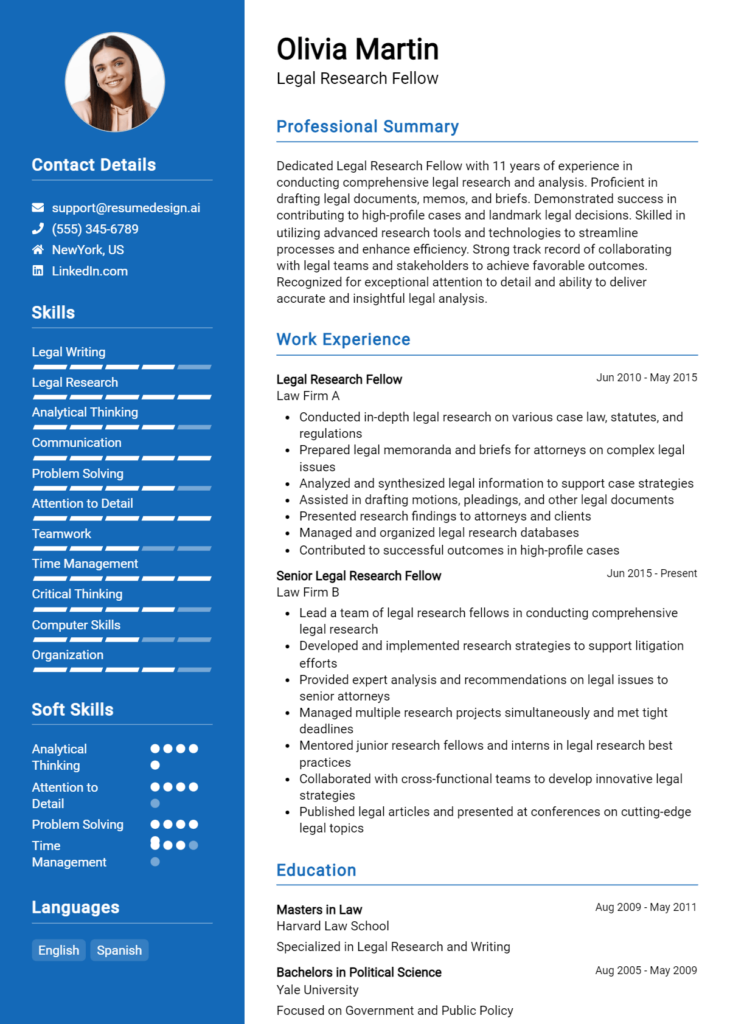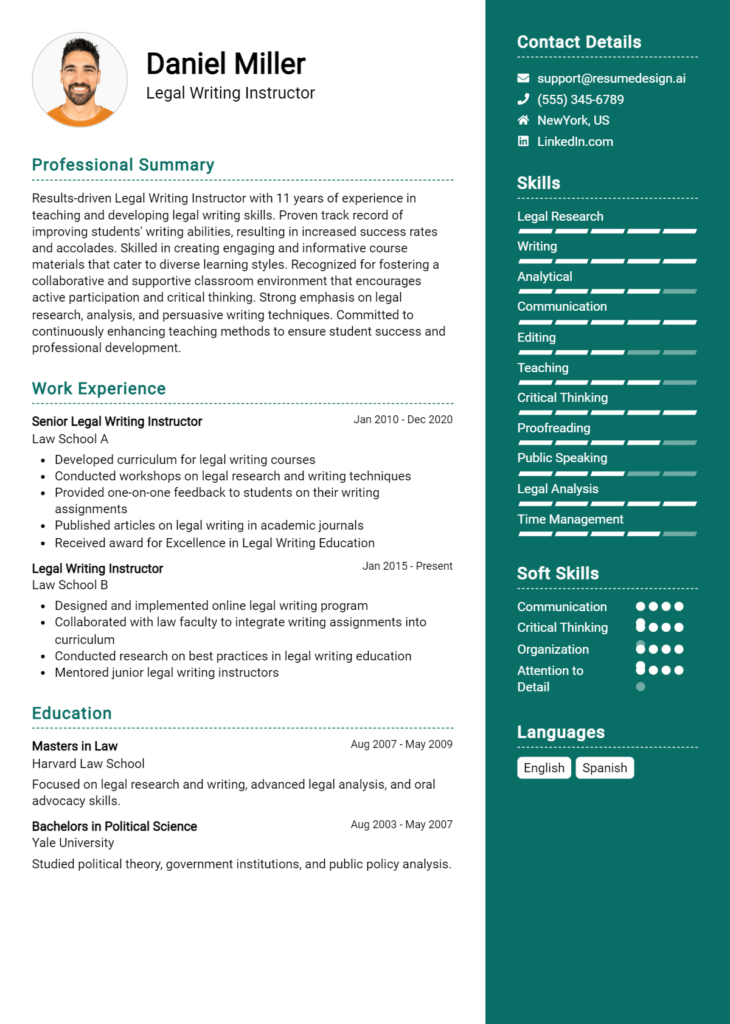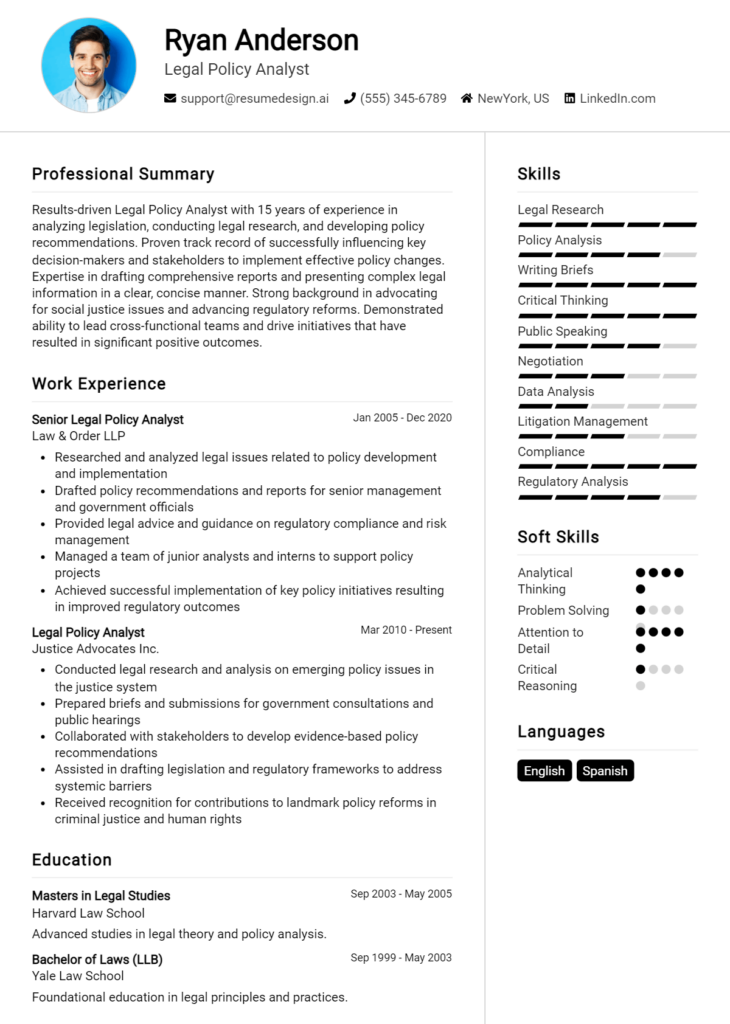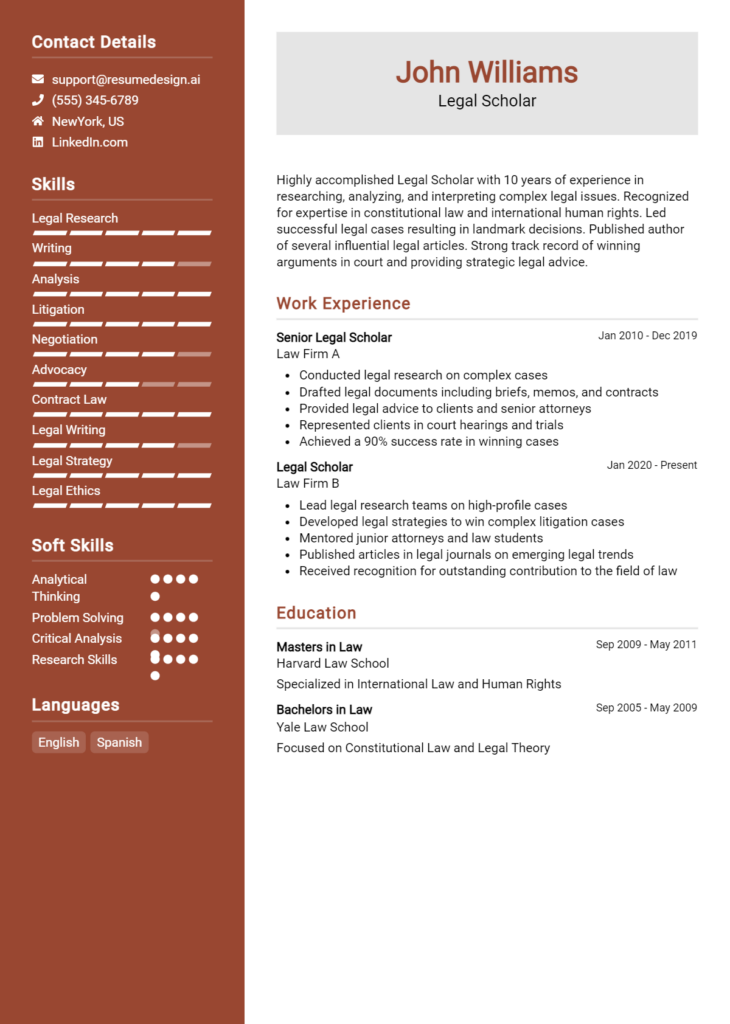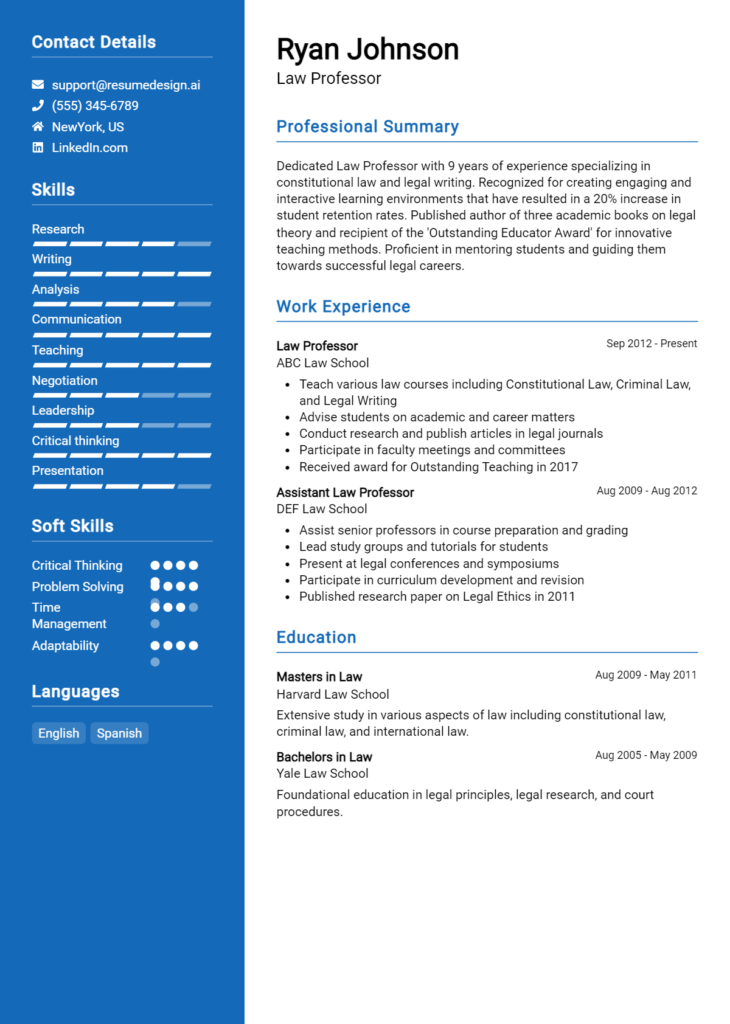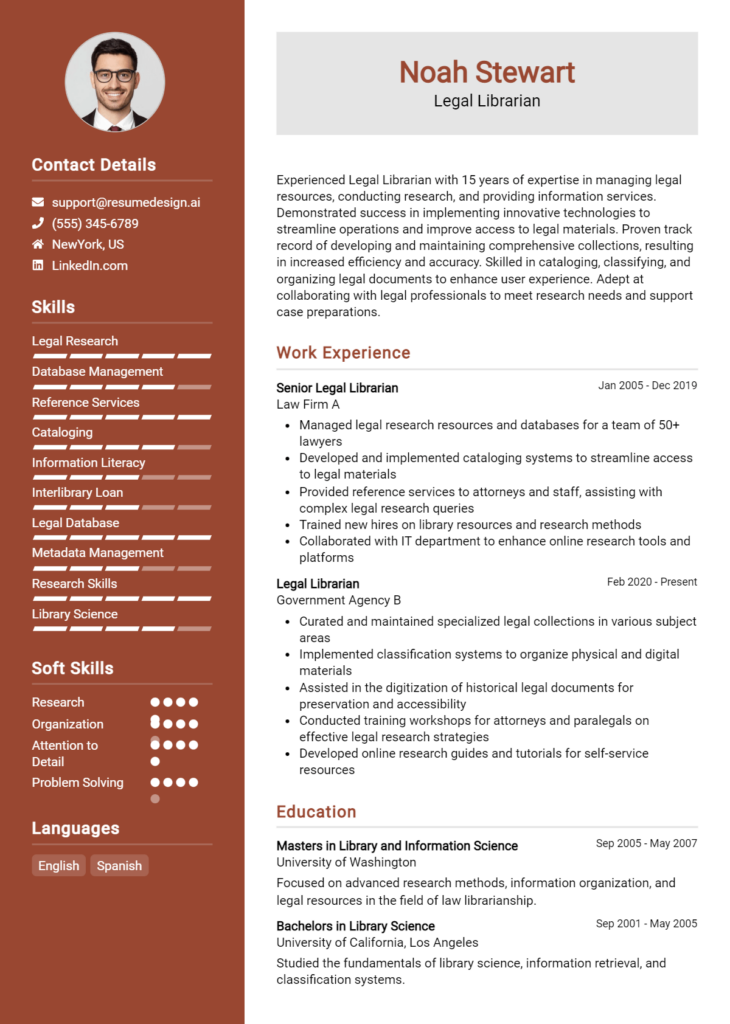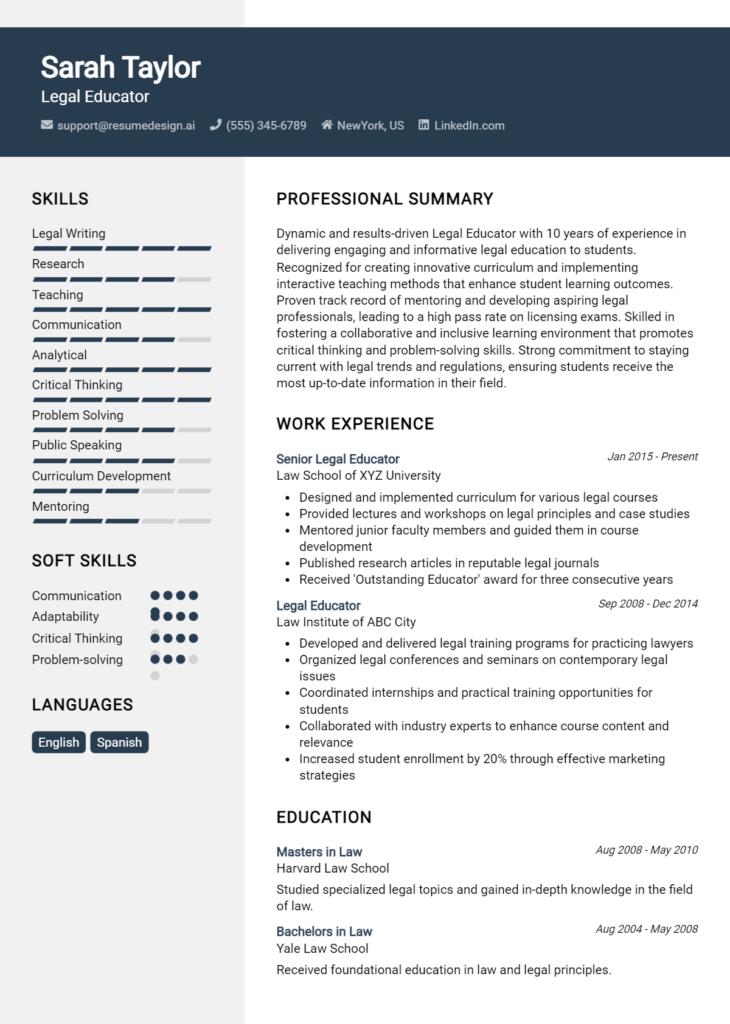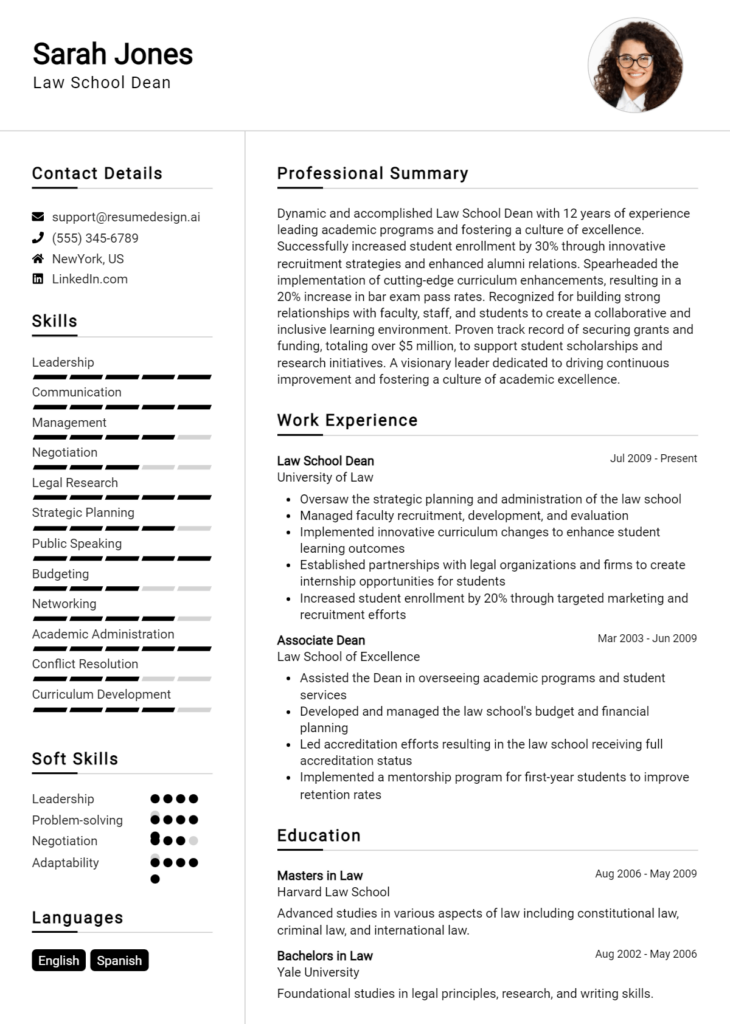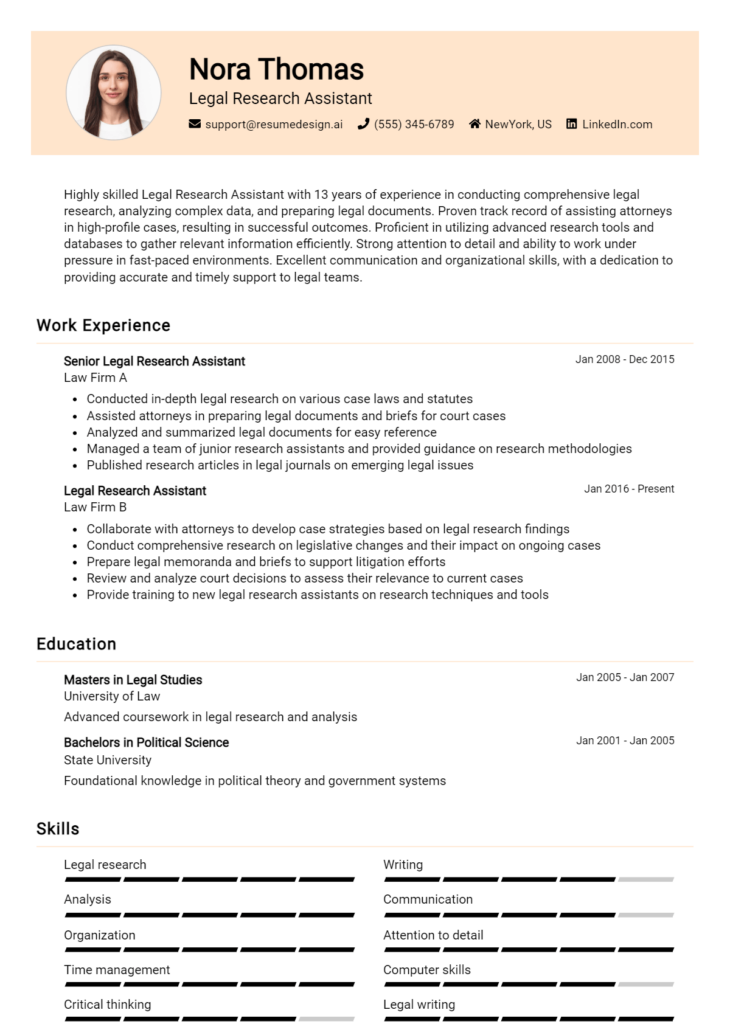Legal Analyst Core Responsibilities
A Legal Analyst plays a crucial role in bridging various departments by conducting thorough legal research, analyzing regulations, and drafting legal documents. This position requires strong technical, operational, and problem-solving skills to interpret complex legal information and provide actionable insights. By ensuring compliance and mitigating risks, a Legal Analyst significantly contributes to the organization's overall goals. A well-structured resume can effectively showcase these qualifications, highlighting the ability to enhance operational efficiency and support strategic decision-making.
Common Responsibilities Listed on Legal Analyst Resume
- Conduct comprehensive legal research on statutes, regulations, and case law.
- Analyze and interpret legal documents and agreements.
- Draft and review contracts, briefs, and other legal documents.
- Assist in preparing for litigation, including discovery and trial preparation.
- Collaborate with various departments to ensure legal compliance.
- Monitor changes in legislation and regulatory policies.
- Develop and maintain legal databases and documentation systems.
- Provide legal advice on business operations and strategic initiatives.
- Identify potential legal risks and recommend mitigation strategies.
- Prepare reports and presentations for stakeholders and management.
- Support internal investigations and compliance audits.
- Engage with external legal counsel and consultants as needed.
High-Level Resume Tips for Legal Analyst Professionals
In the competitive field of legal analysis, a well-crafted resume serves as a crucial gateway to your next career opportunity. It is often the first impression a potential employer receives, making it imperative that your resume not only captures attention but also accurately reflects your skills and achievements. A strong resume should encapsulate your professional journey, showcasing your analytical abilities, legal knowledge, and relevant experience. This guide aims to provide practical and actionable resume tips specifically tailored for Legal Analyst professionals, equipping you with the tools necessary to stand out in a crowded job market.
Top Resume Tips for Legal Analyst Professionals
- Tailor your resume for each job application by aligning your skills and experiences with the specific requirements outlined in the job description.
- Showcase relevant experience by detailing your previous roles in legal research, document review, and case analysis, emphasizing your contributions.
- Quantify your achievements where possible, such as the number of cases worked on or the percentage of successful outcomes you've contributed to.
- Highlight industry-specific skills, including proficiency in legal research tools, knowledge of relevant laws and regulations, and familiarity with case management software.
- Utilize strong action verbs to describe your responsibilities and accomplishments, making your contributions stand out.
- Incorporate keywords from the job listing to ensure your resume resonates with applicant tracking systems (ATS) and hiring managers.
- Include a summary statement that encapsulates your expertise and career aspirations, tailored specifically for the legal sector.
- Keep your resume concise, ideally one page, focusing on the most pertinent information to maintain the reader's interest.
- Proofread meticulously to eliminate any spelling or grammatical errors, as attention to detail is critical in the legal profession.
- Consider adding a section for professional affiliations or certifications to demonstrate your commitment to ongoing education and professional development.
Implementing these tips can significantly increase your chances of landing a job in the Legal Analyst field. By presenting a resume that is tailored, quantifiable, and reflective of your unique qualifications, you position yourself as a strong candidate who is ready to meet the demands of the role and contribute effectively to any legal team.
Why Resume Headlines & Titles are Important for Legal Analyst
In the competitive field of legal analysis, a well-crafted resume headline or title plays a crucial role in making a strong first impression on hiring managers. A compelling headline serves as a succinct summary of a candidate's qualifications, skills, and experience, allowing it to stand out in a sea of applicants. It should encapsulate the essence of the candidate's expertise in a concise and relevant manner, directly aligning with the job being applied for. An impactful resume headline can not only grab attention but also set the tone for the rest of the resume, encouraging hiring managers to delve deeper into the candidate's qualifications.
Best Practices for Crafting Resume Headlines for Legal Analyst
- Keep it concise: Aim for one strong sentence that summarizes your qualifications.
- Be specific: Tailor your headline to reflect the specific role and responsibilities of a Legal Analyst.
- Highlight key skills: Include relevant skills that align with the job description to attract attention.
- Use power words: Incorporate action verbs and impactful language to convey confidence.
- Avoid jargon: Ensure clarity by using industry-standard terms that are easily understood.
- Reflect your experience level: Indicate your years of experience or level of expertise to provide context.
- Match the job description: Align your headline with the keywords and phrases from the job listing.
- Make it unique: Differentiate yourself from other candidates by showcasing what sets you apart.
Example Resume Headlines for Legal Analyst
Strong Resume Headlines
"Detail-Oriented Legal Analyst with 5+ Years of Experience in Corporate Law and Compliance"
“Proficient Legal Analyst Skilled in Conducting In-Depth Legal Research and Drafting Contracts”
“Results-Driven Legal Analyst Specializing in Intellectual Property and Regulatory Affairs”
Weak Resume Headlines
“Legal Analyst Looking for Opportunities”
“Experienced Professional in Law”
The strong headlines are effective because they provide clear and specific information about the candidate's skills and experience, immediately signaling their suitability for the role. They utilize relevant keywords and power phrases that resonate with hiring managers and reflect the candidate's unique strengths. In contrast, the weak headlines fail to impress due to their vagueness and lack of specificity, making it hard for hiring managers to gauge the candidate's qualifications or differentiate them from other applicants. A strong headline can be the difference between capturing attention and being overlooked in the hiring process.
Writing an Exceptional Legal Analyst Resume Summary
A compelling resume summary is crucial for a Legal Analyst as it serves as the first impression for hiring managers, allowing them to quickly gauge a candidate's qualifications. A well-crafted summary highlights key skills, relevant experience, and notable accomplishments in a concise format. By tailoring the summary to the specific job application, candidates can effectively showcase their suitability for the role, making it easier for employers to recognize their potential contributions to the organization.
Best Practices for Writing a Legal Analyst Resume Summary
- Quantify achievements: Use numbers and statistics to demonstrate the impact of your work.
- Focus on relevant skills: Highlight skills that directly align with the job description.
- Tailor the summary: Customize the summary for each job application to reflect the specific requirements.
- Keep it concise: Aim for 2-4 sentences that summarize your qualifications effectively.
- Use strong action verbs: Start sentences with impactful verbs to convey confidence and proactivity.
- Highlight legal knowledge: Emphasize familiarity with relevant laws, regulations, and legal processes.
- Showcase critical thinking: Illustrate your analytical abilities and problem-solving skills.
- Reflect professional tone: Maintain a formal tone that aligns with the legal profession.
Example Legal Analyst Resume Summaries
Strong Resume Summaries
Dedicated Legal Analyst with over 5 years of experience in contract review and compliance, successfully reducing legal risks by 30% through meticulous document analysis and process improvements.
Results-driven Legal Analyst skilled in legal research and case management, contributing to a 40% increase in successful case outcomes by developing comprehensive legal strategies for clients.
Detail-oriented Legal Analyst with expertise in regulatory compliance and litigation support, achieving a 25% reduction in litigation costs over two years by implementing efficient document management systems.
Weak Resume Summaries
Legal Analyst with experience in various legal matters and a strong desire to succeed in a challenging environment.
Motivated legal professional seeking opportunities to utilize analytical skills in a law firm setting.
The strong resume summaries are considered effective because they provide specific achievements and quantifiable results, showcasing the candidate's impact and relevance to the role. In contrast, the weak summaries lack detail, specificity, and measurable outcomes, making them less appealing to hiring managers looking for candidates who can demonstrate their value and expertise in the legal field.
Work Experience Section for Legal Analyst Resume
The work experience section of a Legal Analyst resume is crucial as it serves as a platform to demonstrate the candidate's technical skills, leadership abilities, and capacity to deliver high-quality legal products. This section not only highlights relevant job roles and responsibilities but also provides an opportunity to quantify achievements, showcasing how the candidate has contributed to previous employers. Aligning work experience with industry standards is essential, as it helps potential employers to gauge the applicant's fit for the role and the value they can bring to the organization.
Best Practices for Legal Analyst Work Experience
- Clearly outline relevant legal roles, emphasizing the specific areas of law practiced.
- Incorporate quantifiable results, such as the number of cases handled or percentage improvements in processes.
- Highlight technical expertise, including legal research tools and software proficiency.
- Showcase collaborative efforts, mentioning any cross-functional teams or partnerships.
- Use action verbs to convey a sense of initiative and leadership.
- Align experiences with job descriptions to demonstrate a strong match with the position's requirements.
- Include relevant certifications or training that complement your work experience.
- Focus on impactful contributions to projects that reflect your ability to manage tasks effectively.
Example Work Experiences for Legal Analyst
Strong Experiences
- Led a team of 5 in conducting legal research for a high-profile case, resulting in a 30% reduction in trial preparation time.
- Developed a compliance tracking system that improved adherence to regulatory standards by 25%, significantly reducing potential liabilities.
- Collaborated with cross-departmental teams to streamline contract review processes, decreasing turnaround time by 40% and enhancing client satisfaction.
- Successfully managed over 50 litigation cases, achieving a favorable outcome in 85% of them, which increased the law firm's reputation in the industry.
Weak Experiences
- Assisted with various legal tasks as needed, without specifying the nature or impact of those tasks.
- Worked on several cases and helped the team, but did not quantify contributions or outcomes.
- Participated in meetings and discussions related to legal matters, lacking any specific achievements or responsibilities.
- Handled paperwork for the legal department, which doesn’t convey the scope or significance of the work done.
The examples provided illustrate the stark contrast between strong and weak work experiences. Strong experiences clearly articulate specific achievements and quantify results, demonstrating the candidate's capability to lead, collaborate, and apply technical expertise effectively. In contrast, weak experiences are vague and lack measurable outcomes, failing to convey the candidate’s impact or value in previous roles, making it difficult for employers to assess their potential contributions.
Education and Certifications Section for Legal Analyst Resume
The education and certifications section of a Legal Analyst resume plays a crucial role in showcasing a candidate's academic credentials, relevant certifications, and commitment to ongoing professional development. This section not only highlights the foundational knowledge acquired through formal education but also emphasizes any specialized training that aligns with industry standards. By detailing relevant coursework and certifications, candidates can significantly enhance their credibility, demonstrating their preparedness for the demands of the legal field and their alignment with the specific requirements of the job role.
Best Practices for Legal Analyst Education and Certifications
- Include only relevant degrees and certifications that pertain to the legal field.
- List educational institutions and certification bodies with their respective locations for credibility.
- Provide details on coursework that is directly applicable to the role of a Legal Analyst.
- Highlight advanced degrees (e.g., Master's or Juris Doctor) and well-recognized certifications (e.g., Certified Paralegal).
- Use bullet points for clarity and to make the section easy to read.
- Include dates of completion for degrees and certifications to show recent qualifications.
- Consider adding any honors or distinctions received during academic pursuits.
- Keep this section concise while ensuring it reflects your ongoing commitment to professional growth.
Example Education and Certifications for Legal Analyst
Strong Examples
- Bachelor of Arts in Legal Studies, University of California, Berkeley, 2021
- Certified Paralegal (CP), National Association of Legal Assistants, 2022
- Courses in Contract Law, Legal Research, and Ethics, University of California, Berkeley
- Master of Science in Legal and Ethical Studies, John Jay College of Criminal Justice, 2023
Weak Examples
- Bachelor of Science in Biology, University of Florida, 2018
- Certification in Microsoft Office Suite, 2019
- Online Course in Creative Writing, Coursera, 2020
- High School Diploma, Anytown High School, 2015
The strong examples are considered effective because they directly relate to the field of legal analysis, showcasing relevant degrees and certifications that enhance the candidate’s qualifications. They reflect a focused educational path and a commitment to acquiring industry-specific skills. In contrast, the weak examples are less effective as they include irrelevant degrees and certifications that do not contribute to the candidate's legal expertise or applicability to the role of a Legal Analyst, thus failing to support the necessary qualifications for the position.
Top Skills & Keywords for Legal Analyst Resume
As a Legal Analyst, having the right skills is crucial for success in the role. A well-crafted resume that highlights both hard and soft skills can significantly enhance your chances of securing a position in this competitive field. Employers look for candidates who possess analytical abilities, attention to detail, and strong communication skills among others. These skills not only reflect your competence in legal research and analysis but also demonstrate your capability to work collaboratively within a legal team. By showcasing your skills effectively on your resume, you can present yourself as a valuable asset to potential employers.
Top Hard & Soft Skills for Legal Analyst
Soft Skills
- Analytical Thinking
- Attention to Detail
- Communication Skills
- Problem-Solving
- Research Skills
- Time Management
- Team Collaboration
- Adaptability
- Critical Thinking
- Interpersonal Skills
- Organization
- Negotiation Skills
- Conflict Resolution
- Ethical Judgment
- Client Management
Hard Skills
- Legal Research
- Document Review
- Case Management Software Proficiency
- Knowledge of Legal Terminology
- Data Analysis
- Contract Drafting
- Regulatory Compliance
- Litigation Support
- Familiarity with Legal Databases (e.g., Westlaw, LexisNexis)
- Proficient in Microsoft Office Suite
- Legal Writing and Drafting
- E-Discovery Tools
- Financial Analysis
- Intellectual Property Law Knowledge
- Familiarity with Federal and State Laws
For more insights on how to effectively present your skills and highlight your work experience, consider incorporating these elements into your resume to stand out in the legal field.
Stand Out with a Winning Legal Analyst Cover Letter
As a dedicated and detail-oriented legal professional with a strong background in legal research and analysis, I am excited to apply for the Legal Analyst position at [Company Name]. My experience in reviewing legal documents, conducting in-depth research, and supporting attorneys in case preparation has equipped me with the skills necessary to contribute effectively to your team. I am particularly drawn to [Company Name] due to its commitment to excellence and innovation in the legal field, and I am eager to bring my analytical abilities and passion for law to your esteemed organization.
In my previous role at [Previous Company Name], I successfully managed a diverse range of legal projects, including contract analysis, compliance audits, and litigation support. My ability to distill complex legal concepts into clear, actionable insights enabled our team to make informed decisions that significantly improved our clients' legal standing. I am adept at utilizing legal research tools and databases, which has allowed me to provide comprehensive and accurate information to attorneys and stakeholders. Furthermore, my strong communication skills have facilitated effective collaboration within cross-functional teams, ensuring that all legal matters are addressed promptly and thoroughly.
I am particularly impressed by [Company Name]'s recent initiatives in [specific project or area], and I believe that my proactive approach and keen analytical mind would make me a valuable asset to your team. I am eager to contribute my expertise in legal analysis and research to further enhance your firm's reputation for providing exceptional legal services. I am confident that my background and enthusiasm for the law would align well with the goals of [Company Name], and I look forward to the opportunity to discuss how I can support your team in achieving its objectives. Thank you for considering my application; I hope to hear from you soon.
Common Mistakes to Avoid in a Legal Analyst Resume
When crafting a resume for a Legal Analyst position, it’s crucial to present your skills and experiences effectively to stand out in a competitive field. However, many applicants make common mistakes that can undermine their chances of landing an interview. Here are some pitfalls to avoid when creating your Legal Analyst resume:
Using a Generic Template: A one-size-fits-all resume can fail to highlight your specific qualifications. Tailor your resume to reflect the job description and your unique skills.
Neglecting Relevant Experience: Focusing solely on general work experience can overlook critical legal internships, projects, or coursework that demonstrate your analytical abilities. Always prioritize relevant experience.
Overloading with Legal Jargon: While familiarity with legal terminology is important, excessive jargon can make your resume difficult to read. Use clear and concise language that is accessible to all readers.
Ignoring Keywords: Many employers use Applicant Tracking Systems (ATS) to screen resumes. Failing to include relevant keywords from the job posting can result in your resume being overlooked.
Lacking Quantifiable Achievements: Merely listing duties without showcasing accomplishments can weaken your resume. Use metrics and examples to demonstrate the impact of your work.
Inconsistent Formatting: A cluttered or inconsistent format can distract from your qualifications. Ensure that your resume has a clean layout, with uniform fonts, bullet points, and headings.
Including Irrelevant Information: Listing unrelated jobs or skills can dilute the focus on your legal expertise. Stick to experiences and qualifications that pertain directly to the legal field.
Forgetting to Proofread: Spelling and grammatical errors can create a negative impression. Always proofread your resume multiple times, or ask someone else to review it for you.
Conclusion
As we explored the essential responsibilities and skills required for the role of a Legal Analyst, it’s clear that this position demands a strong analytical mindset, attention to detail, and a solid understanding of legal principles. Legal Analysts play a crucial role in conducting research, analyzing legal documents, and providing support to legal teams, making their contributions invaluable in the legal field.
To effectively showcase your qualifications and experiences, it’s important to have a well-crafted resume that highlights your relevant skills and accomplishments. We encourage you to take the time to review and update your Legal Analyst resume to ensure it stands out to potential employers.
Utilize the following resources to enhance your application materials:
- Check out our resume templates to find a design that suits your style.
- Take advantage of our resume builder for an easy and efficient way to create a professional resume.
- Explore resume examples to gain insights into effective formats and content.
- Don’t forget to complement your resume with a strong cover letter using our cover letter templates.
Now is the perfect time to refine your resume and position yourself for success in the competitive legal job market!

